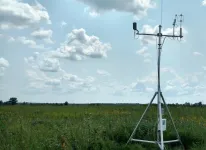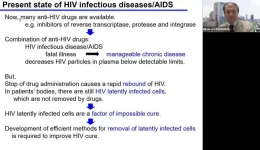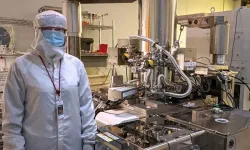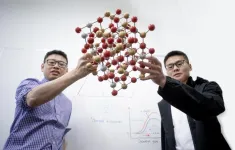Screening newborns for "bubble-baby" disease saves lives
Survival rates of babies after bone-marrow transplants jumped significantly after screening for SCID – severe combined immunodeficiency disease – started in North America in 2008, a major study finds.
2023-06-21
(Press-News.org)
Screening newborns for severe combined immunodeficiency disease (SCID) significantly increases the survival of children after bone marrow transplantation, a new North American study finds.
Published today in The Lancet with an accompanying editorial, the retrospective study was co-led by Elie Haddad, an Université de Montréal medical professor and clinician scientist, pediatrician and immunologist at the UdeM-affiliated CHU Sainte-Justine mother-and-child hospital.
The research shows that the gradual adoption of newborn screening for SCID since 2008 in North America has boosted the survival rate from 73 per cent between 1982 and 2009 to 87 per cent between 2010 and 2018.
The survival rate jumped to 92.5 per cent in children whose SCID was detected and treated at birth, whereas it was much lower in children diagnosed after the onset of symptoms. Furthermore, the proportion of babies transplanted and who never contracted an infection was significantly higher, an aspect that played a major role in increasing their survival.
Also known as "bubble-baby" disease, SCID causes major immune cell dysfunction and affects 40 to 80 children annually in North America. Children with SCID appear perfectly healthy at birth but are extremely susceptible to infection. The disease is fatal (usually within the first year of life) unless the child receives treatment, such as a bone marrow transplant, gene therapy or enzyme therapy.
"The improvement in post-transplant survival is staggering and alone justifies the implementation of a newborn screening test for SCID and other life-threatening diseases of the immune system," said Haddad, who is also the recipient of the BMO Chair in Pediatric Immunology and the head of the Immuno-allergy and Rheumatology division at CHU Sainte-Justine. "This study highlights the importance of prevention and of collaboration in precision health."
Several studies had suggested that systematic neonatal screening for SCID could improve the survival rate of affected children, but the data were inconclusive. Done in collaboration with numerous research centres in Canada and the U.S., Haddad's shows that the increase in the survival rate of children with transplants coincides with the rollout of a screening test in various North American regions begun in 2008. Since 2018, all U.S. states have been conducting preventive screening for SCID. In Canada, seven provinces and territories have followed suit; in Quebec, the process is underway.
The continuing adoption of newborn screening has made it possible to detect the disease earlier before symptoms appear, and to take all possible steps to prevent infection and quickly provide treatment. Previous research already showed that being younger than 3.5 months at the time of transplant and the absence of infection significantly improved survival rates.
"Given that we are preventing children from dying and from undergoing much more difficult treatments with subsequent consequences," said Haddad, "these results will encourage other countries around the world to adopt newborn screening for SCID and other life-threatening immune diseases that the test can detect."
END
ELSE PRESS RELEASES FROM THIS DATE:
2023-06-21
Specially designed gardens could reduce the amount of a toxic chemical associated with tires entering our waterways by more than 90 per cent, new research shows.
Tired toxins
The chemical 6PPD-quinone can form when car tires interact with the atmosphere. It enters rivers and streams when rain runs off roads into waterways. It is toxic to coho salmon, rainbow trout and some other fish.
“Rain gardens”, or bioretention cells, are gardens engineered to reduce flooding and soak up contaminants when road runoff is directed ...
2023-06-21
One of the main reasons plants use water is to allow them to absorb carbon dioxide from the atmosphere. This means that, in plants, the water and carbon cycles are tightly linked. In a new study, researchers from the University of Missouri and the United States Department of Agriculture (USDA) used this foundational principle to identify sustainable farming practices aimed at helping staple crops like corn and soybeans thrive during extreme weather conditions that have become more common in the Midwest.
This study examined how farming practices affect crop resilience to climate change by examining water and carbon ...
2023-06-21
SAN FRANCISCO — PLOS today is announcing that it will soon launch two new journals: PLOS Mental Health and PLOS Complex Systems. PLOS sees these new journals as an opportunity to give evolving research communities opportunities to forge a new path for research in the field. Whether that means welcoming new ways of sharing research transparently or cementing new policies that enable research to be evaluated and rewarded more fairly, or simply finding a broader audience where research can make a greater real-world impact.
PLOS Mental Health provides a dedicated venue for all mental health research, connecting global experts from a broad range of disciplines and addressing challenges ...
2023-06-21
A research team led by Tokyo Medical and Dental University (TMDU) has identified a molecular compound that activates latent HIV-1 in cells, showing promise for HIV treatments
Tokyo, Japan – A multi-institutional research group led by researchers from Tokyo Medical and Dental University (TMDU) has made a significant and promising step forward in our ability to treat human immunodeficiency virus type 1 (HIV-1), the virus underlying acquired immunodeficiency syndrome (AIDS).
To appreciate their accomplishment, we must first know a little about why HIV-1 is difficult to eliminate. ...
2023-06-21
– By Will Ferguson
For the first time, researchers at the Department of Energy’s Lawrence Berkeley National Laboratory (Berkeley Lab) have developed a genome-scale way to map the regulatory role of transcription factors, proteins that play a key role in gene expression and determining a plant’s physiological traits. Their work reveals unprecedented insights into gene regulatory networks and identifies a new library of DNA parts that can be used to optimize genetic engineering efforts in plants.
“Transcription factors regulate things like how plants grow, how much fruit they produce, ...
2023-06-21
CHAMPAIGN, Ill. — Fifteen years of archaeological work in the Tam Pa Ling cave in northeastern Laos has yielded a reliable chronology of early human occupation of the site, scientists report in the journal Nature Communications. The team’s excavations through the layers of sediments and bones that gradually washed into the cave and were left untouched for tens of thousands of years reveals that humans lived in the area for at least 70,000 years – and likely even longer.
“When we first started excavating the cave, we never expected to find humans in that region,” said University of Illinois Urbana-Champaign anthropology professor Laura Shackelford, who led ...
2023-06-21
A new tool for generating microwave signals could help propel advances in wireless communication, imaging, atomic clocks, and more.
Frequency combs are photonic devices that produce many equally spaced laser lines, each locked to a specific frequency to produce a comb-like structure. They can be used to generate high-frequency, stable microwave signals and scientists have been attempting to miniaturize the approach so they can be used on microchips.
Scientists have been limited in their abilities to tune these microcombs at a rate to make them effective. But a team of researchers ...
2023-06-21
By Lindsay Brownell
(BOSTON) — The amount of data generated by scientists today is massive, thanks to the falling costs of sequencing technology and the increasing amount of available computing power. But parsing through all that data to uncover useful information is like searching for a molecular needle in a haystack. Machine learning (ML) and other artificial intelligence (AI) tools can dramatically speed up the process of data analysis, but most ML tools are difficult for non-ML experts to access and use. Recently, automated machine learning (AutoML) methods have been developed that can automate the design and deployment ...
2023-06-21
An international team of researchers, led by University of Toronto Engineering Professor Yu Zou, is using electric fields to control the motion of material defects. This work has important implications for improving the properties and manufacturing processes of typically brittle ionic and covalent crystals, including semiconductors — a crystalline material that is a central component of electronic chips used for computers and other modern devices.
In a new study published in Nature Materials, researchers from ...
2023-06-21
About The Study: This study of 23 undocumented immigrants with kidney failure receiving emergency dialysis found that a peer support group intervention achieved feasibility and acceptability. The findings suggest that a peer support group may be a patient-centered strategy to build camaraderie and provide emotional support in kidney failure, especially for socially marginalized uninsured populations who report limited English proficiency.
Authors: Lilia Cervantes, M.D., of the University of Colorado, Anschutz Medical Campus, in Aurora, is the corresponding author.
To ...
LAST 30 PRESS RELEASES:
[Press-News.org] Screening newborns for "bubble-baby" disease saves lives
Survival rates of babies after bone-marrow transplants jumped significantly after screening for SCID – severe combined immunodeficiency disease – started in North America in 2008, a major study finds.





